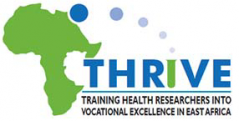THRiVE Cambridge (2009 to 2022)
THRiVE-2 Fellows' Profiles
THRiVE-2 Partners
THRiVE-1 and THRiVE -2 Alumni
THRiVE Policies
THRiVE Fellows and Alumni Publications
Cambridge University's role in the THRiVE programme (2009 - 2022)

Cambridge University is one of the world’s leading research-based multi-faculty universities, and has outstanding research capabilities and influence. As a partner in the THRiVE programme (led from Makerere University in Uganda), Cambridge is keen to provide co-ordinated, cross-faculty research strengthening and scientific training activities to African scientists. This would help to tackle regional health problems in Africa and support Africans in developing their own regional centers of excellence for scientific education and training. Central to this programme is the principle of supporting African PhD and post-doctoral research on African priorities, in Africa.
The Wellcome Trust funded the £6.2 million THRiVE programme (2009 - 2015). East African students registered for PhDs in their home universities with local supervisors, but received support in the form of co-supervision and co-mentorship from leading Cambridge research scientists.
This and other innovative capacity-building and knowledge-exchange partnerships with African universities and institutes are building equitable and sustainable, North-South and South-South, networks to:
- build critical masses of local research capacity for African priorities
- support human resources and infrastructure for African research excellence
- contribute to research training and career pathway development for the best African researchers
- support individual, institutional, and national scientific leadership in African universities.
Cambridge’s participation in the THRiVE programme is being led by Professor David Dunne (Pathology), who has 30 years’ experience of collaborative research with African partners on neglected diseases in Kenya, Uganda, Mali and other parts of Africa.
THRiVE-2
The Wellcome Trust and Department for International Development has committed £5.25 million for a further five years (2016-2022) of funding for THRiVE-2 as part of the Developing Excellence in Leadership, Training and Science Initiative (DELTAS), which aims to improve health in Africa through research driven by the most urgent regional challenges.
African PhD students can spend up to six months of their 4-year research programmes in their Cambridge mentor's laboratory. Postdoctoral level researchers, on the other hand, are being offered 2-year fellowships with also the possibility of spending up to six months with their mentors in Cambridge. Both Cambridge and Africa supervisors/mentors can exchange visits to provide maximum support and mentorship. THRiVE fellows who chose to visit Cambridge will have access to a range of specialized training and transferable skills courses, lectures and seminars which are delivered through more than 150 departments and associated research institutes, including the Wellcome Trust Sanger Institute. By training and developing the scientific careers of PhD students and post-doctoral fellows, THRiVE-2 will build on the successes of THRiVE, a regional network of research excellence, to create research leaders in infectious diseases, neglected tropical disease, maternal, neonatal and reproductive health, and non-communicable diseases.
For more information on THRiVE Consortium website.

